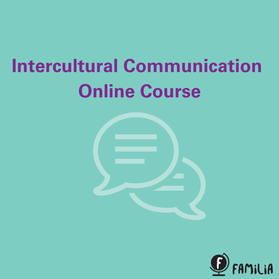Welcome to INTERCULTURAL COMMUNICATION SELF-STUDY COURSE
Good communication is the key to any successful relationship. We communicate with our partner and family daily, whether it is verbally or non-verbally - we are in constant interaction with others. But what if the differences in the way we speak and think make it more difficult for us to communicate? What if we use words, expressions and sentences differently than our partner? What if their views on matters in life are so contrary that it is hard to neutrally talk about them? Especially in cases when partners have different mother tongues or otherwise cultural differences, there can be an increased amount of misunderstandings that may result in conflicts. Miscommunication easily causes disconnection, frustration, hurt and resentment. Communication is skill that can always be improved and reflected on. When we work on our communication, we can get closer to our spouse, form a deeper connection and prevent smaller issues from becoming bigger ones. In this course you can learn how to communicate more effectively with your partner and improve your communication skills in general. You will learn to reflect on your own and on your partner’s communication style and find exercises to apply the theories in practice.
HOW TO USE THIS ONLINE COURSEThe course consists of reading material, quotes from professionals, educational videos and exercises. We will guide you through six themes about communication. With the first three themes you can learn about basic aspects of intercultural communication. The other three themes dive deeper and give you additional knowledge and tips about communication.
Summary of the themes: 1. Communication styles: Recognising our own and our partner’s way of communicating 2. Listening: Four vital models of listening 3. Interpretation of communication: How to avoid misunderstandings and communicate clearly 4. Non-violent communication: Components and modes of NVC by Marshall Rosenberg, (2003) 5. Love languages: Introduction to the 5 love languages by Gary Chapman (2005) 6. Conflict prevention and resolution: 4 tips about how to successfully deal with conflict You can do this course individually by yourself, or with your partner. In the ideal case the course is taken together with the partner, so that you can discuss the themes and work on the communication together. If your partner does not want to participate it is nothing to get worried about. Even if you take the course alone, improving personally in your communication, your partner might notice a change in the way you communicate and catch up on it. You can be an example and increase the chances of motivating your partner this way. The good thing about self-study courses is the fact that you can work on the themes according to your own schedule. You can flexibly choose when to work on which topic. We still want to advise you to preferably start with the basic themes 1-3, and then move forward to the more advanced themes 4-6. Nevertheless, feel free to develop your own plan and topic order depending on your personal needs. Enjoy working on the course and remember: Practice makes perfect. We are all learners! theme 1: Communication styles |
QUICK LINKS TO THE COURSE THEMES
FURTHER LEARNING:
|
|
|
© Familia 2024


